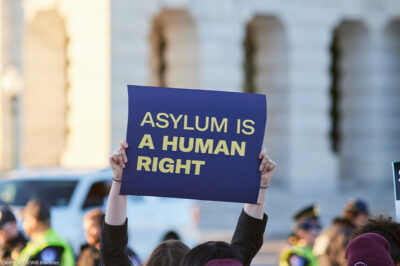Groups Sue to Stop Excessive Citizenship Delays
FBI Name Checks Disrupt Lives and Stall Naturalization Process for Thousands
FOR IMMEDIATE RELEASE
CONTACT: media@aclu.org
LOS ANGELES – Many immigrants who have satisfied the requirements to become U.S. citizens are left in limbo for months or years due to slow processing of FBI name checks, according to a class-action lawsuit to be filed in federal court. The delays violate time limits in the law that are meant to reduce naturalization backlogs while ensuring national security.
In its lawsuit, the ACLU of Southern California, the National Immigration Law Center, the Asian Pacific American Legal Center, and the law firm of Munger, Tolles & Olson ask a federal judge to enforce the time limits on name checks for people in the naturalization process. The lawsuit, Bavi v. Mukasey, names as defendants Attorney General Michael Mukasey and the FBI, which conducts the checks, and the U.S. Citizenship and Immigration Service (USCIS), which oversees the naturalization process.
Plaintiffs and attorneys will be available to speak to reporters at 11 a.m. today, Tuesday, December 4, at the ACLU of Southern California, 1616 Beverly Blvd., L.A. 90026.
“People’s lives are on hold because they are in a bureaucratic black hole. They can’t travel abroad without worrying they will be blocked at the border. They can’t vote. They can’t get business or school loans,” said ACLU of Southern California staff attorney Ranjana Natarajan.
An FBI name check is a routine part of every naturalization application, along with fingerprint and background checks. The name checks are particularly prone to cause delays because similar names result in many false “hits” that are time-consuming to resolve. The checks can slow the scheduling of naturalization interviews as well as delay final approval of naturalization.
An USCIS ombudsman found that the FBI name check backlogs have grown worse over the past few years, and that the name checks themselves may have little value in identifying persons who pose a threat. According to the report, “the current USCIS name check policy may increase the risk to national security by extending the time a potential criminal or terrorist remains in the country.”
Thousands of Americans nationwide have been forced to go to court to unblock the delay of their naturalization cases. The government routinely fights or settles these cases rather than fix the underlying problems with name checks.
The ACLU’s clients in Bavi v. Mukasey include Alex Lee, 26, who was born in South Korea and emigrated with his family in 1998. He applied for citizenship in December 2006. Last Friday he watched in frustration as his parents and brother took the oath of citizenship, even though they filed their applications months later.
Another client, Abbas Amirichimeh, was born in Iran and came to the U.S. in 1993 to study electrical engineering. He is now a highly trained microchip designer in Irvine, California. Despite that, he has waited more than four years for a response to his naturalization application, which he filed in May 2003.
The ninth of 10 children, Amirichimeh was unable to travel to Iran after the deaths of his father, aunt, uncle and grandfather because he feared he would be stopped when he returned.
“By training, I believe that if there is a problem, we should come up with a solution,” said Amirichimeh. “I feel as if my life is floating.”
A government official Amirichimeh spoke to on the phone recently confirmed that the only thing holding up his naturalization was a name check, and suggested he seek a lawyer.
Bavi v. Mukasey is one of several similar lawsuits that are pending around the country, and the first to address backlogs for both people who have had their naturalization interviews and those who have not.
The USCIS ombudsman’s report is available online at:
www.dhs.gov/xlibrary/assets/CISOMB_Annual_Report_2007.pdf
Stay Informed
Every month, you'll receive regular roundups of the most important civil rights and civil liberties developments. Remember: a well-informed citizenry is the best defense against tyranny.




